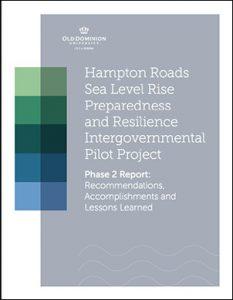 After two years, the Hampton Roads Sea level Rise and Resilience Intergovernmental Planning Pilot Project (Intergovernmental Pilot Project or IPP), convened at Old Dominion University, has come to a successful close. Although the conclusion of the project is different than originally imagined by the drafters of the IPP Charter, the process in and of itself brought hundreds of stakeholders together, built lasting and ongoing relationships, and produced many workable recommendations for the region that can be accomplished by a variety of partnerships. The key deliverables include a whole of government mitigation and adaptation planning process and an integrated regional recommendation, both which can serve as a template for other regions. Additionally the IPP demonstrated a new role for an urban campus to act as a community convener, matching focused research and curriculum development with public service across the university and the region.
After two years, the Hampton Roads Sea level Rise and Resilience Intergovernmental Planning Pilot Project (Intergovernmental Pilot Project or IPP), convened at Old Dominion University, has come to a successful close. Although the conclusion of the project is different than originally imagined by the drafters of the IPP Charter, the process in and of itself brought hundreds of stakeholders together, built lasting and ongoing relationships, and produced many workable recommendations for the region that can be accomplished by a variety of partnerships. The key deliverables include a whole of government mitigation and adaptation planning process and an integrated regional recommendation, both which can serve as a template for other regions. Additionally the IPP demonstrated a new role for an urban campus to act as a community convener, matching focused research and curriculum development with public service across the university and the region.
Initiated in June 2014, the IPP was an effort to use the knowledge, skills and expertise of all regional stakeholders to create a framework or template for intergovernmental strategic planning that could be used outside the region; and, to implement that integrated strategy in Hampton Roads, Virginia, creating an effective and efficient method for planning holistically for sea level rise and recurrent flooding. This “Whole of Government and Community” effort would not have been successful without the hundreds of stakeholders and volunteer leaders from across all levels of government, academia, and the community who participated out of a sense of duty to their community and commitment to the collaboration.
Knowing water knows no jurisdictional bounds, a high level of intergovernmental collaboration is necessary to develop integrated regional solutions and implement effective sea level rise preparedness and resilience strategies. Additionally, the wider community in Hampton Roads recognizes that they too will be affected by not only sea level rise itself, but also the adaptation strategies implemented in preparation. Executive Summary Phase 2 Report: Recommendations, Accomplishments and Lessons Learned Executive Summary 11 Phase 1 of the project, from June 2014 through June 2015, saw the drafting and signing of a Charter, the recruitment of a steering committee, a host of events, and the development of working group and advisory committees comprised of subject matter experts. Phase 2, from June 2015 through June 2016, included heavy discussion with regard to ongoing strategies for intergovernmental collaboration as well as research, a number of case studies carried out by committees and working groups, and the careful development of recommendations for the region.
The IPP concludes successfully with a series of recommendations from each working group and committee as well as a final resolution drafted by the Legal Working Group and containing the consensus views of steering committee members. Though the recommendations vary in specificity and subject area, a few themes are clear. In order to move forward regionally, local stakeholders need to maintain, institutionalize and build relationships with each other in order to facilitate effective collaboration and information sharing. Institutionalizing these relationships and partnerships is key, as people shift positions throughout their careers. Additionally, while more data is needed, the methods by which that data is integrated and shared are equally important. Further, some form of the Whole of Government and Community approach that focuses on the watershed as opposed to jurisdictional boundaries is essential to accomplishing the recommendations set forth in this report.
The IPP has been a success because of the dedicated volunteers committed to a resilient Hampton Roads. During the last two years, this project advanced regional adaptation through the evaluation and recommendation of a future governance structure, the development of working group and committee recommendations, building public awareness, building awareness of the need for federal agency involvement locally and building relationships among numerous organizations involved in the Pilot Project. All of this work, which in pieces may be specific only to a unique circumstance or area, when taken as a whole, brings foundational change. It builds on previous work accomplished by other leaders in the Hampton Roads region and should be leveraged in the future to accelerate regional adaptation.
Click here for the full report.




